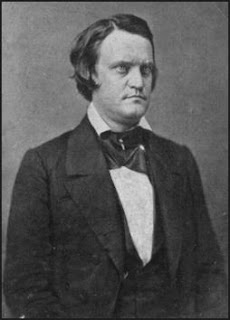Worst American Birthdays, vol. 37
 One of the great traitors of the Civil War era, John Cabell Breckinridge, was cut loose into the world on this date in 1821.
One of the great traitors of the Civil War era, John Cabell Breckinridge, was cut loose into the world on this date in 1821.
Born less than a year after the Missouri Compromise, which prohibited slavery in most of the Louisiana territories, Breckinridge came to despise the arrangement, believing it had unfairly prohibited slaveholders from transporting and enjoying their property wherever they chose. His views on state sovereignty were derived from his grandfather, for whom he was named. As a state representative, the elder John Breckinridge had introduced a famous resolution in 1798 asserting the fiction that individual states had a constitutional right to nullify federal laws. The Kentucky Resolution, along with its companion in Virginia, became one of the pole stars for states’ rights ideologues throughout the 19th century. Over the next several decades, the Breckinridge family itself divided into uncomfortable factions over this very issue. When South Carolina attempted to invalidate a federal tariff law in 1832, Robert Breckinridge — young John’s uncle — voted to condemn the act in Kentucky’s legislature, arguing in effect that his own father had been mistaken to assert the right of nullification.
As a member of the third generation of Kentucky’s royal family, John C. Breckinridge was an ambitious and successful lawyer who scaled the state’s political ladder to the US Congress, where he represented the 8th District during some of the more tumultuous years of the 1850s. In 1854, Breckinridge joyfully voted to approve the Kansas-Nebraska Act, which repealed the 1820 Compromise and turned the Kansas territory into a magnet for pro-slavery goons and abolitionist messiahs like John Brown.
Having done his part to further sectional hostilities over the extension of slavery, Breckinridge ascended to the executive branch, where he served as helpmate to James Buchanan, inarguably one of the worst presidents in the nation’s history. Less than a week after his inauguration to office as Vice President, Breckinridge yelped with glee as the Supreme Court issued its ruling on a case involving a slave named Dred Scott. Indeed, he was so thrilled with the court’s ruling that he paid to have copies of Roger Taney’s majority opinion printed and scattered across his home state.
Following his term as Vice President, Breckinridge and his pro-slavery Southern partisans cleaved the Democratic Party in two for the election of 1860. His futile campaign for the presidency assured Abraham Lincoln’s election. When his own state chose not to join the movement for secession, Breckinridge — by then occupying a seat in the US Senate — defied the majority sentiments of his fellow Kentuckians (including his uncle Robert) and vocally supported the Confederacy in its armed rebellion against the Union. In so doing, Breckinridge set forth the novel argument that “the United States no longer exists,” that the withdrawal of twelve states had “dissolved” the Constitution and that the federal government no longer had any power to conduct business. In disbelief that his state would not endorse or join the Confederacy, Breckinridge insisted that Kentucky had been taken over by pro-Union conspirators.
Predictably evicted from office by his Senate colleagues and made an “orphan” by the state of Kentucky, Breckinridge proudly accepted “the musket of a soldier” and fought in defense of chattel slavery. When the end of the war at last arrived in April 1865, Breckinridge held a dispiriting post as Secretary of War. As much as anyone in the Confederacy, John Breckinridge deserved to wear a hemp necklace; after several years of exile in Cuba, Canada and the UK, however, he received a grant of amnesty and returned home in 1869. Twelve years after his death, a statue in Breckinridge’s honor was cast in front of the Fayette County courthouse in Lexington.
Last year, Raoul Vega — a sporadic blogger from the Lexington area — offered this sensible appraisal of the monument :
What I would like to see more than anything else would be the destruction, Saddam style, of the statue of Breckinridge. It might be replaced with some other worthy Kentuckian, or even with Abraham Lincoln, who was, after all, born in the state. Cassius Marcellus Clay, an abolitionist born in Kentucky and educated at Transylvania University, would be one option. Barring that, I’d like this added to his statue:
JOHN C. BRECKINRIDGEBELIEVED THAT THE RIGHT OF WHITE PEOPLE TO OWN BLACK PEOPLE WAS WORTH KILLING FOR


